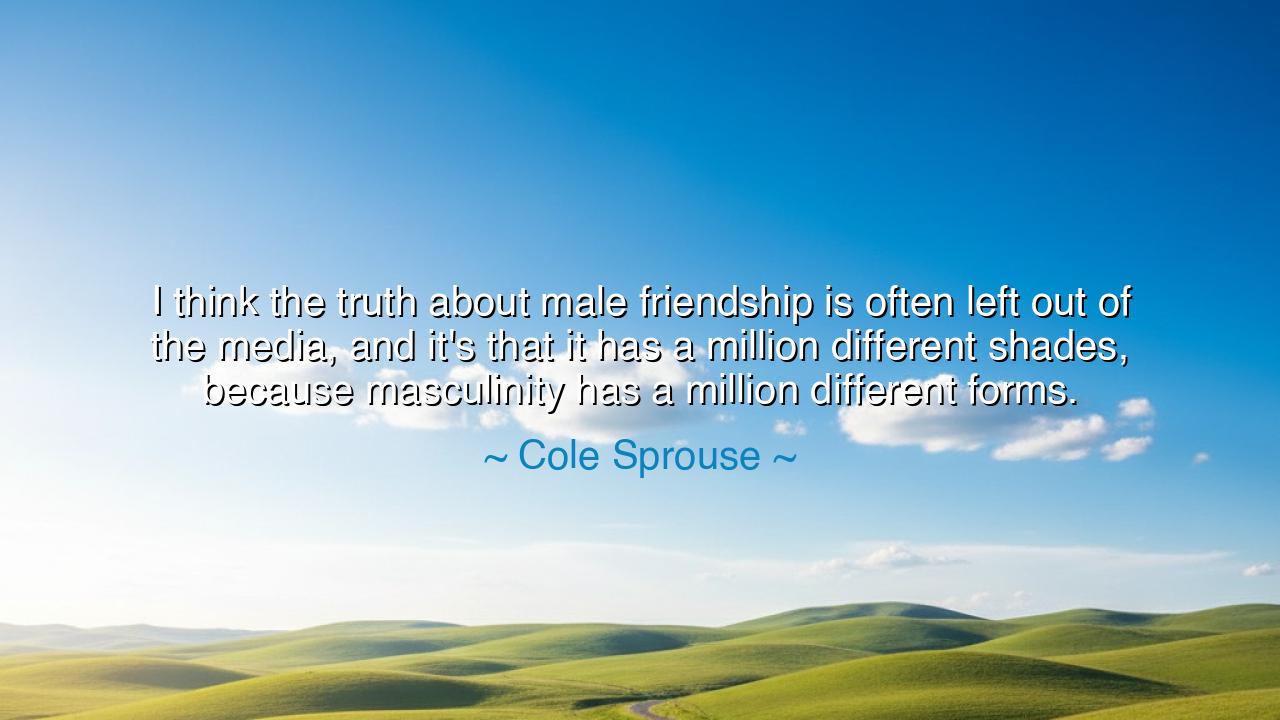
I think the truth about male friendship is often left out of the
I think the truth about male friendship is often left out of the media, and it's that it has a million different shades, because masculinity has a million different forms.






The actor and thinker Cole Sprouse, known not only for his art but for his insight into the human spirit, once said: “I think the truth about male friendship is often left out of the media, and it’s that it has a million different shades, because masculinity has a million different forms.” Beneath this reflection lies a profound understanding of both the beauty and the struggle of modern manhood. It is a call to see men not as singular, stoic figures, but as beings of complexity, tenderness, and depth. Sprouse reminds us that friendship among men—long flattened into clichés of toughness or rivalry—actually encompasses a vast and nuanced spectrum of emotion. His words are an appeal for truth, for a vision of masculinity that embraces vulnerability as much as strength.
The meaning of this quote rests upon the recognition that male friendship is as intricate and multi-colored as the human soul itself. Yet society, through its myths and its media, has often reduced it to caricature. Too often we are shown men who bond only through conquest, competition, or shared rebellion—but rarely through compassion, emotional honesty, or quiet loyalty. Sprouse speaks to the hidden layers of male connection—the gentle moments of understanding, the wordless support, the brotherhood that stands not in noise but in steadfast presence. Just as masculinity takes many forms—warrior, poet, father, dreamer—so too do the friendships of men mirror those forms, each shade revealing a different truth about what it means to love and to stand beside another.
The origin of this struggle goes back to the ancient codes of manhood. In the old world, men were taught that to be strong was to be silent, that emotion was weakness, and that tenderness was unmanly. Yet, even then, true friendship among men defied these boundaries. In Homer’s Iliad, the bond between Achilles and Patroclus transcended all notions of pride and power—it was a love both fierce and tender, forged in battle but rooted in the soul. Achilles, the mightiest of warriors, wept openly for his fallen friend; his rage and sorrow tore through the heavens. Through this story, the ancients already knew what Sprouse now reminds us: that masculinity is not a prison of hardness, but a vessel for many forms of strength, including grief, affection, and loyalty.
Modern society, however, has often forgotten this ancient wisdom. The image of the “strong, silent man” has been glorified to such a degree that many men grow up fearing the intimacy of friendship. They guard their emotions behind humor or competition, afraid of being misunderstood. Yet, beneath that armor, they yearn for connection—for a bond where they can be seen and accepted without condition. In Sprouse’s words, we hear the echo of that longing: a call to restore honesty to the way we depict male friendship, and to reclaim the emotional vocabulary that centuries of expectation have stripped away.
History gives us luminous examples of men who dared to live this truth. C.S. Lewis and J.R.R. Tolkien, two giants of literature, shared a friendship that changed the world of storytelling. Their bond was not born of rivalry but of shared faith, imagination, and the courage to challenge one another’s ideas. They met weekly as part of a fellowship known as the Inklings, where they critiqued, inspired, and supported one another. It was through this brotherhood that The Lord of the Rings and The Chronicles of Narnia were born. Their friendship reveals that masculine bonds, when rooted in respect and emotional honesty, can nurture creativity and moral strength—not through dominance, but through shared vulnerability and vision.
Sprouse’s insight into masculinity’s many forms is therefore both modern and eternal. He speaks for a generation that seeks to heal the fractures of gender expectation—to allow men to cry without shame, to love their friends without restraint, to express empathy without apology. For when men are freed from the narrow definitions of strength, their friendships can become sacred ground—places of healing, laughter, and unspoken understanding. In acknowledging “a million shades,” Sprouse invites us to see manhood not as a fixed state, but as a living spectrum, evolving as the heart evolves.
The lesson for all who hear his words is clear and profound: cherish the friendships that allow you to be your whole self. Whether you are a man or woman, do not measure strength by silence or emotion by weakness. Encourage the men around you to speak, to feel, to connect—to live as complete beings. For friendship, in its truest form, is not bound by gender; it is the recognition of the divine in another. Let us, then, tell new stories—stories that show men as they truly are: fierce and gentle, strong and vulnerable, leaders and learners, protectors and poets.
So let Cole Sprouse’s words stand as a torch in the modern wilderness—a reminder that the truth of male friendship lies not in what society expects, but in what the heart reveals. Just as the ancients saw friendship as the highest form of love, so too must we reclaim it as the measure of our humanity. For when men are allowed to be whole, their friendships become not only bonds between individuals, but bridges toward a more compassionate world.






AAdministratorAdministrator
Welcome, honored guests. Please leave a comment, we will respond soon